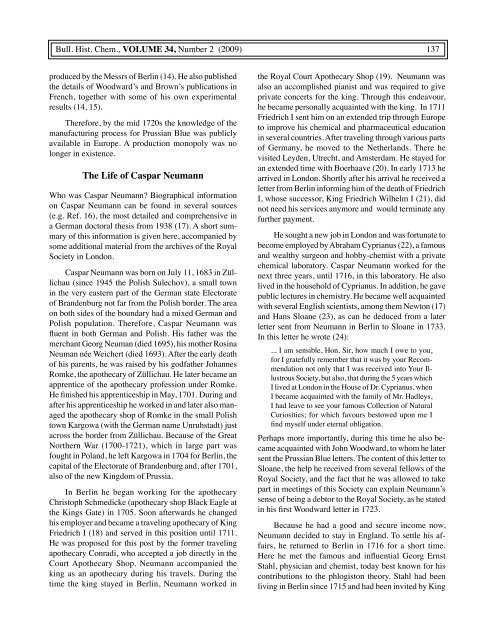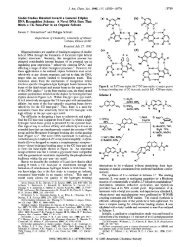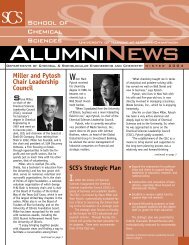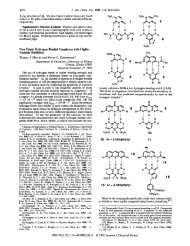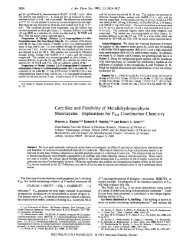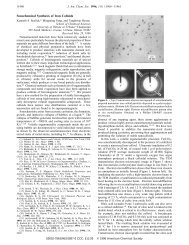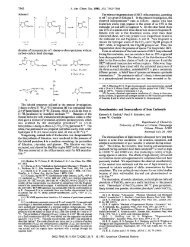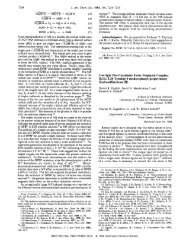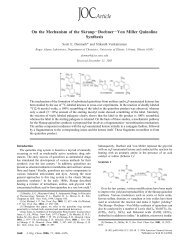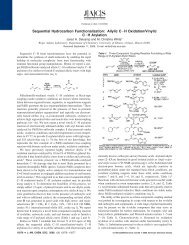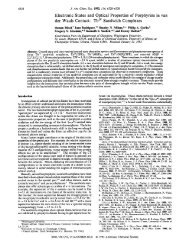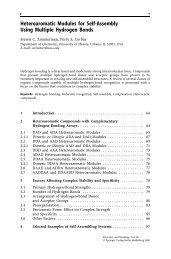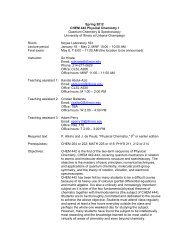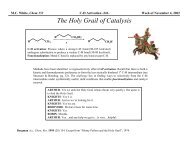On tWO LEttErs frOM casPar nEUMann tO JOhn WOOdWard ...
On tWO LEttErs frOM casPar nEUMann tO JOhn WOOdWard ...
On tWO LEttErs frOM casPar nEUMann tO JOhn WOOdWard ...
Create successful ePaper yourself
Turn your PDF publications into a flip-book with our unique Google optimized e-Paper software.
Bull. Hist. Chem., VOLUME 34, Number 2 (2009) 137<br />
produced by the Messrs of Berlin (14). He also published<br />
the details of Woodward’s and Brown’s publications in<br />
French, together with some of his own experimental<br />
results (14, 15).<br />
Therefore, by the mid 1720s the knowledge of the<br />
manufacturing process for Prussian Blue was publicly<br />
available in Europe. A production monopoly was no<br />
longer in existence.<br />
the Life of caspar neumann<br />
Who was Caspar Neumann? Biographical information<br />
on Caspar Neumann can be found in several sources<br />
(e.g. Ref. 16), the most detailed and comprehensive in<br />
a German doctoral thesis from 1938 (17). A short summary<br />
of this information is given here, accompanied by<br />
some additional material from the archives of the Royal<br />
Society in London.<br />
Caspar Neumann was born on July 11, 1683 in Züllichau<br />
(since 1945 the Polish Sulechov), a small town<br />
in the very eastern part of the German state Electorate<br />
of Brandenburg not far from the Polish border. The area<br />
on both sides of the boundary had a mixed German and<br />
Polish population. Therefore, Caspar Neumann was<br />
fluent in both German and Polish. His father was the<br />
merchant Georg Neuman (died 1695), his mother Rosina<br />
Neuman née Weichert (died 1693). After the early death<br />
of his parents, he was raised by his godfather Johannes<br />
Romke, the apothecary of Züllichau. He later became an<br />
apprentice of the apothecary profession under Romke.<br />
He finished his apprenticeship in May, 1701. During and<br />
after his apprenticeship he worked in and later also managed<br />
the apothecary shop of Romke in the small Polish<br />
town Kargowa (with the German name Unruhstadt) just<br />
across the border from Züllichau. Because of the Great<br />
Northern War (1700-1721), which in large part was<br />
fought in Poland, he left Kargowa in 1704 for Berlin, the<br />
capital of the Electorate of Brandenburg and, after 1701,<br />
also of the new Kingdom of Prussia.<br />
In Berlin he began working for the apothecary<br />
Christoph Schmedicke (apothecary shop Black Eagle at<br />
the Kings Gate) in 1705. Soon afterwards he changed<br />
his employer and became a traveling apothecary of King<br />
Friedrich I (18) and served in this position until 1711.<br />
He was proposed for this post by the former traveling<br />
apothecary Conradi, who accepted a job directly in the<br />
Court Apothecary Shop. Neumann accompanied the<br />
king as an apothecary during his travels. During the<br />
time the king stayed in Berlin, Neumann worked in<br />
the Royal Court Apothecary Shop (19). Neumann was<br />
also an accomplished pianist and was required to give<br />
private concerts for the king. Through this endeavour,<br />
he became personally acquainted with the king. In 1711<br />
Friedrich I sent him on an extended trip through Europe<br />
to improve his chemical and pharmaceutical education<br />
in several countries. After traveling through various parts<br />
of Germany, he moved to the Netherlands. There he<br />
visited Leyden, Utrecht, and Amsterdam. He stayed for<br />
an extended time with Boerhaave (20). In early 1713 he<br />
arrived in London. Shortly after his arrival he received a<br />
letter from Berlin informing him of the death of Friedrich<br />
I, whose successor, King Friedrich Wilhelm I (21), did<br />
not need his services anymore and would terminate any<br />
further payment.<br />
He sought a new job in London and was fortunate to<br />
become employed by Abraham Cyprianus (22), a famous<br />
and wealthy surgeon and hobby-chemist with a private<br />
chemical laboratory. Caspar Neumann worked for the<br />
next three years, until 1716, in this laboratory. He also<br />
lived in the household of Cyprianus. In addition, he gave<br />
public lectures in chemistry. He became well acquainted<br />
with several English scientists, among them Newton (17)<br />
and Hans Sloane (23), as can be deduced from a later<br />
letter sent from Neumann in Berlin to Sloane in 1733.<br />
In this letter he wrote (24):<br />
... I am sensible, Hon. Sir, how much I owe to you,<br />
for I gratefully remember that it was by your Recommendation<br />
not only that I was received into Your Illustrous<br />
Society, but also, that during the 5 years which<br />
I lived at London in the House of Dr. Cyprianus, when<br />
I became acquainted with the family of Mr. Hadleys,<br />
I had leave to see your famous Collection of Natural<br />
Curiosities; for which favours bestowed upon me I<br />
find myself under eternal obligation.<br />
Perhaps more importantly, during this time he also became<br />
acquainted with John Woodward, to whom he later<br />
sent the Prussian Blue letters. The content of this letter to<br />
Sloane, the help he received from several fellows of the<br />
Royal Society, and the fact that he was allowed to take<br />
part in meetings of this Society can explain Neumann’s<br />
sense of being a debtor to the Royal Society, as he stated<br />
in his first Woodward letter in 1723.<br />
Because he had a good and secure income now,<br />
Neumann decided to stay in England. To settle his affairs,<br />
he returned to Berlin in 1716 for a short time.<br />
Here he met the famous and influential Georg Ernst<br />
Stahl, physician and chemist, today best known for his<br />
contributions to the phlogiston theory. Stahl had been<br />
living in Berlin since 1715 and had been invited by King


